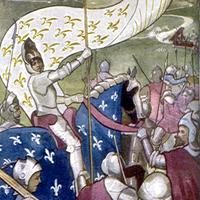45. Round the World
"The far-famed ship Victoria men shall sight Anchored in safest waters by Seville, When she had girdled ocean-plain profound, And circled earth in one continuous round. " —CAMOENS. It was the 28th of November 1520, when three ships sailed out into the open sea. Two had already deserted, and basely made for home to spread ill reports about the stout-hearted Magellan.
They now sailed northward along the far coast of South America to escape the intense cold. The violent sudden tempests of the Atlantic had given place to steady winds, which drove them gently over the calm surface of the Pacific Ocean. This lasted for three months and twenty days. But during this time their sufferings were intense. Once more a Sea of Darkness must be crossed. The brave hearts despaired as day after day passed away, week after week, month after month, and their straining eyes could catch no sight of land. As they sailed on and on over the immense waste of waters, the great size of the world began to dawn on them. It was so much larger than any one had ever imagined. They had thought on leaving the shores of America that they would soon find the coast of Asia or India.
All December and January they sailed on. Daily their sufferings became more intense. The old historian tells us the heartrending details.
"Having consumed all their biscuits and other victuals," he says, "they fell into such necessity that they were forced to eat the biscuit powder that remained, now full of worms. They did eat skins and pieces of leather which were folded about certain great ropes of the ships. But these skins being made very hard by reason of the sun, rain, and wind, they hung them by a cord in the sea for the space of four or five days to soften them. By reason of the famine and unclean feeding, some of their gums grew so over their teeth that they died. " Indeed nineteen died and thirty more lay too ill to do any work. Still they sailed on over this ever-lasting stretch of water—vast beyond all knowing. Still that iron will of the commander never bent. With resolute eyes Magellan gazed westward for that land that he knew they must reach sooner or later, for the world, he knew, was round.
At last, after ninety-eight days of weary sailing, they came upon some islands where they could get fresh vegetables and fruit, and end their acute sufferings. After ten days' refreshment they left the islands, and sailed on in search of more land. They soon reached another group, which were afterwards named the Philippine Islands, after Philip of Spain, who was born six years after their discovery.
Though no Europeans had been here before, yet traders from China were here; and Magellan soon realised the importance of the place. He must be near the famous Spice Islands, too, for the natives brought spice to exchange, as well as bananas and cocoa-nuts.
With the good supply of food the sick sailors soon grew better; and for some time Magellan cruised about the islands, making friends as well as Christians of the natives. The Easter services were performed on one of the islands with great ceremony, a cross and crown of thorns was presented to the native king, to be set up on the highest mountain in the island, that all might see and worship.
Thus April passed away in teaching the natives, trading, and establishing the power of Spain everywhere.
But on one island his religious enthusiasm carried Magellan too far. Deciding to subdue a troublesome chief, Magellan landed on one of the islands. It was early dawn on the morning of April 27, 1521. He at once sent a message to the king to beg him to pay tribute to Spain, or he should learn how lances wounded. The answer was defiant. If the Spaniards had lances, the islanders had reeds and stakes hardened by fire.
With forty-eight armed men Magellan stepped ashore, to be met by hundreds and thousands of natives. The fight was desperate and against fearful odds. Again and again Magellan was wounded, until at last, says the old historian who fought by his side all through that last day,—"at last the Indians threw themselves upon him with iron-pointed bamboo spears and every weapon they had and ran him through,—our mirror, our light, our comforter, our true guide,—until they killed him. " So died Magellan, in a miserable skirmish, at the last. With a dauntless courage, in the face of tremendous odds, he had accomplished his work. He had sailed westward over the unknown part of the ocean to a part already reached by Europeans going eastward, thus proving once and for ever that the world was round. The foaming straits at the foot of South America will ever bear his name, which is one of the most famous in the history of discovery.
And who took home the great news?
The little ship Victoria alone. On the 16th May, with starvation thinning her ranks, one mast gone, her timbers strained and worn, she cleared the Cape of Good Hope on her homeward way, and a friendly current bore her over the equator. So starving were the sailors—of whom there were but eighteen left—that they had to stop at the Cape de Verde Islands to recruit. And it was not till September 8 that the welcome shores of Spain hove in sight, and the famine-stricken Spaniards stepped ashore to tell the story of their three years' voyage. It was a story without equal in its sufferings and misery, its failure and success,—a story without equal in the annals of history, for it told of the first circumnavigation of the globe by Magellan.

